Human Resource Management: Processes, Recruitment, Diversity & Contemporary Issues
1/85
There's no tags or description
Looks like no tags are added yet.
Name | Mastery | Learn | Test | Matching | Spaced | Call with Kai |
|---|
No analytics yet
Send a link to your students to track their progress
86 Terms
What is the primary role of human resource management (HRM) in an organization?
To plan, develop, and administer policies and programs for effective management of people.
What are the primary functions of the HR department?
Compensation, hiring and dismissing staff, performance management, organizational development, safety and wellness, employee motivation, communication, administration, and training.
What is human resource planning?
A systematic process of forecasting future HR needs to ensure the organization has the right number and type of employees.
What is job analysis?
The process of identifying and determining the details of a particular job, leading to the creation of a job description and job specification.
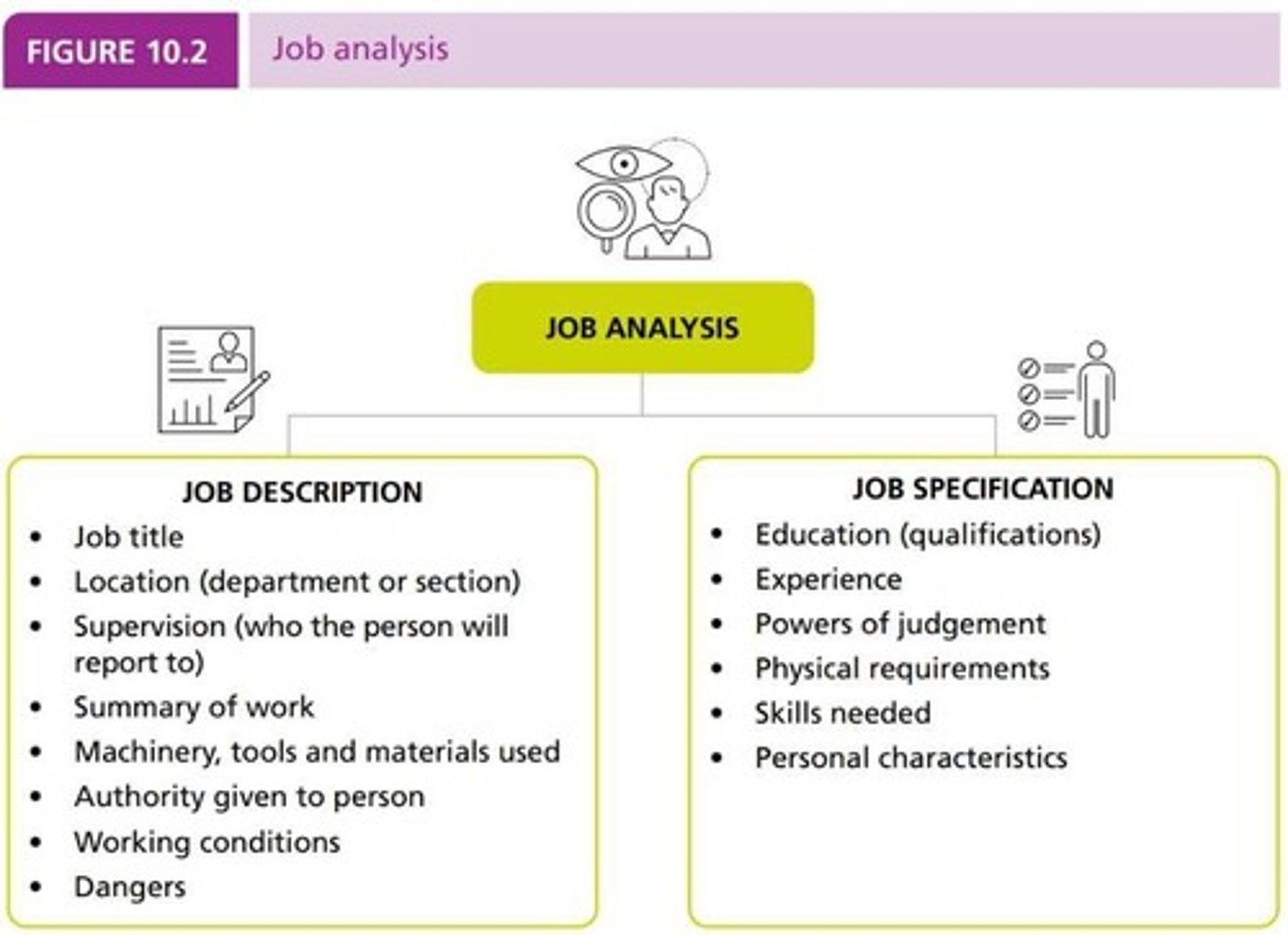
What are the four steps necessary for effective human resource planning?
1. Analyzing present HR supply, 2. Forecasting HR demand, 3. Balancing projected HR demand with supply, 4. Supporting organizational goals.
What challenges might arise from workforce diversity in an organization?
Legal restrictions when employing foreigners and cultural differences among employees.
What is the significance of effective HRM in relation to employee productivity?
Effective HRM supports the achievement of the organization's goals and objectives by enhancing employee productivity.
What does recruitment involve in the context of HRM?
The process of identifying and hiring the best-qualified candidate for a vacancy in a timely and cost-effective manner.
How does HRM contribute to organizational success?
By ensuring the organization employs the right number and type of employees continuously, leading to efficient use and maintenance of labor.
What is the difference between human resource provision and retention?
Provision involves acquiring the right talent, while retention focuses on maintaining and developing existing employees.
What is the role of an HR manager?
To oversee HR functions including training, development, remuneration, labor relations, and personnel administration.
What is the purpose of onboarding and orientation in HRM?
To introduce new employees to the organization and its culture, ensuring they are well-integrated into their roles.
What factors can lead to fluctuations in an organization's HR needs?
Employee turnover, retirements, consumer demand changes, and technological advancements.
Why is job analysis important in HRM?
It helps in creating accurate job descriptions and specifications, ensuring the right candidates are recruited.
What does HR planning aim to achieve?
To ensure that the organization has enough people with the right skills at the right time for long-term productivity.
What is the impact of globalization on HRM?
It requires managers to consider diverse cultures and legal restrictions when managing a global workforce.
What is the relationship between HRM and employee rights?
HRM must ensure compliance with laws that protect employee rights to function legally and ethically.
What are the key components of a job description?
Duties, responsibilities, and requirements of a specific job.
What is the significance of HR departments in larger organizations?
They handle all HR activities, ensuring specialized management of human resources.
What is the role of HR planning in addressing staffing challenges?
HR planning must be flexible to adapt to short-term staffing challenges and long-term changes in the business environment.
What is the difference between internal and external HR supply options?
Internal options refer to current employees being promoted or reassigned, while external options involve hiring from outside the organization.
What is the main goal of HRM in relation to labor?
To ensure the efficient use and maintenance of labor to support organizational objectives.
What is the purpose of HR planning in recruitment?
To identify vacancies that need to be filled and to initiate the recruitment process.
What does a job description provide?
A detailed list of the duties and requirements of a specific job.
What is the role of a job specification?
To describe the knowledge, skills, education, experience, and abilities required to perform a job.
What is the difference between a job description and a job specification?
A job description defines the duties of a job, while a job specification outlines the qualifications needed by the person filling the job.
What are the steps in the recruitment process?
1. Identify a vacancy 2. Conduct a job analysis 3. Advertise the position 4. Shortlist candidates 5. Selection of candidates.
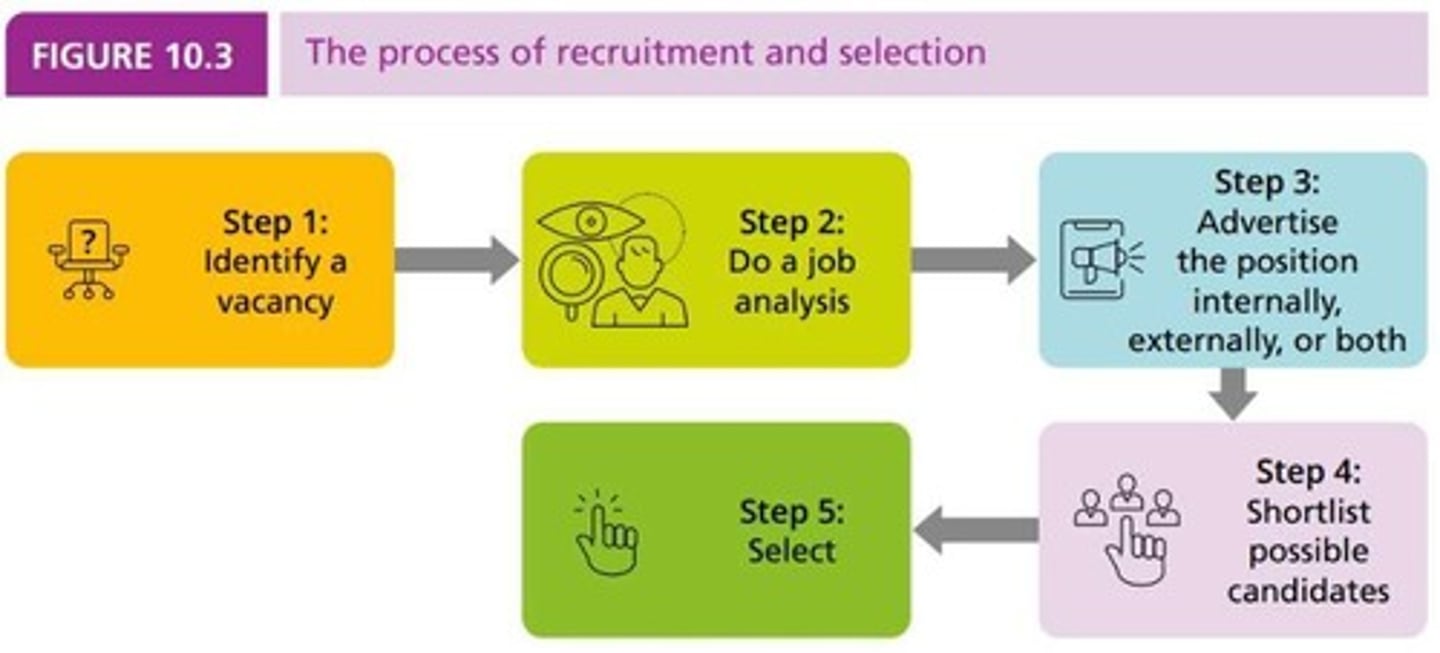
What is the significance of a detailed job analysis?
It helps to clarify the details of the position and the qualifications needed, ensuring the right candidates apply.
What are the advantages of internal recruitment?
Candidates are already known to the organization, understand the work culture, and it can enhance loyalty and job satisfaction.
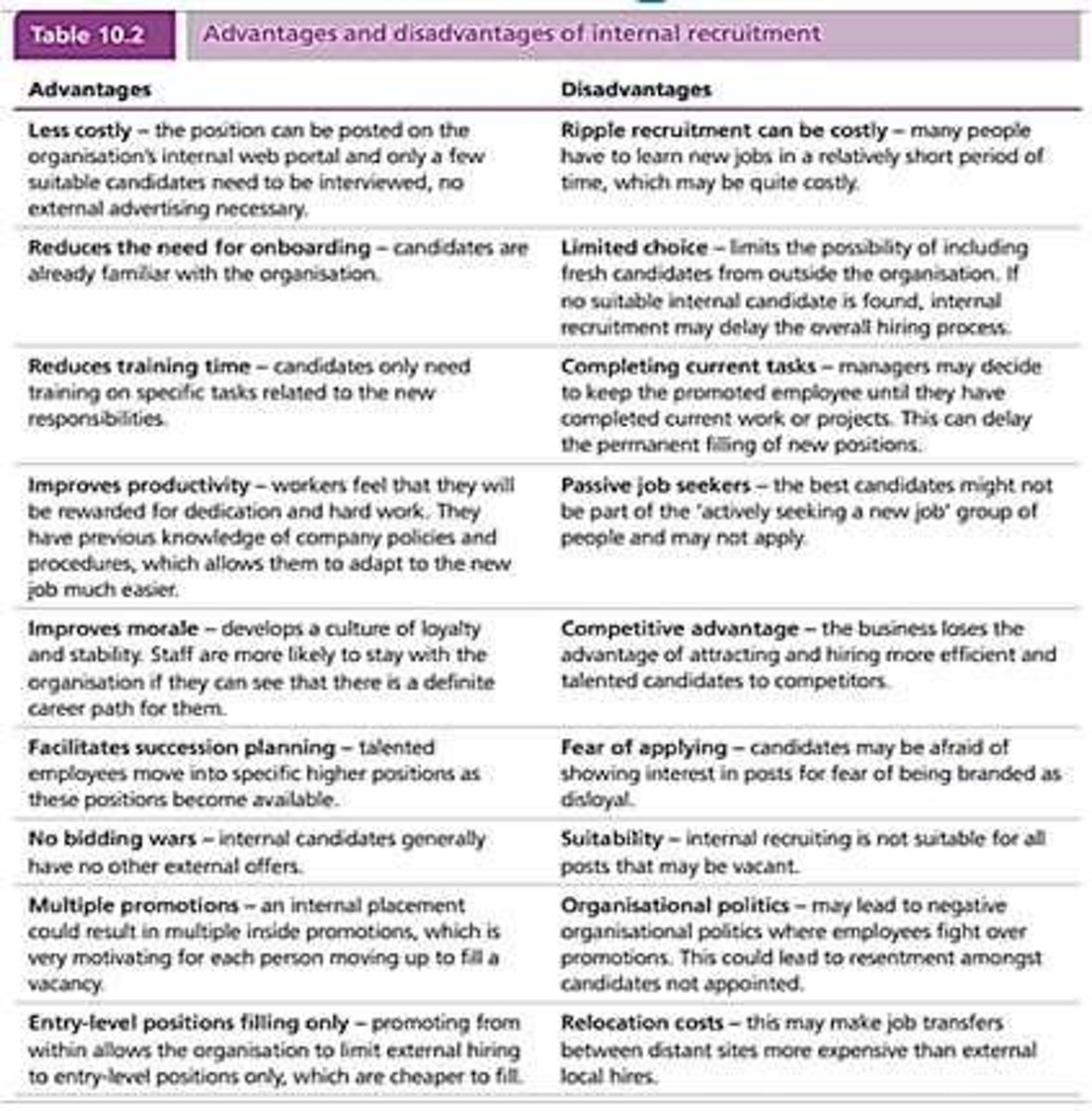
What is external recruitment?
The process of hiring candidates from outside the organization.
What is a major advantage of external recruitment?
It allows the organization to bring in fresh perspectives and ideas, especially when a new direction is needed.
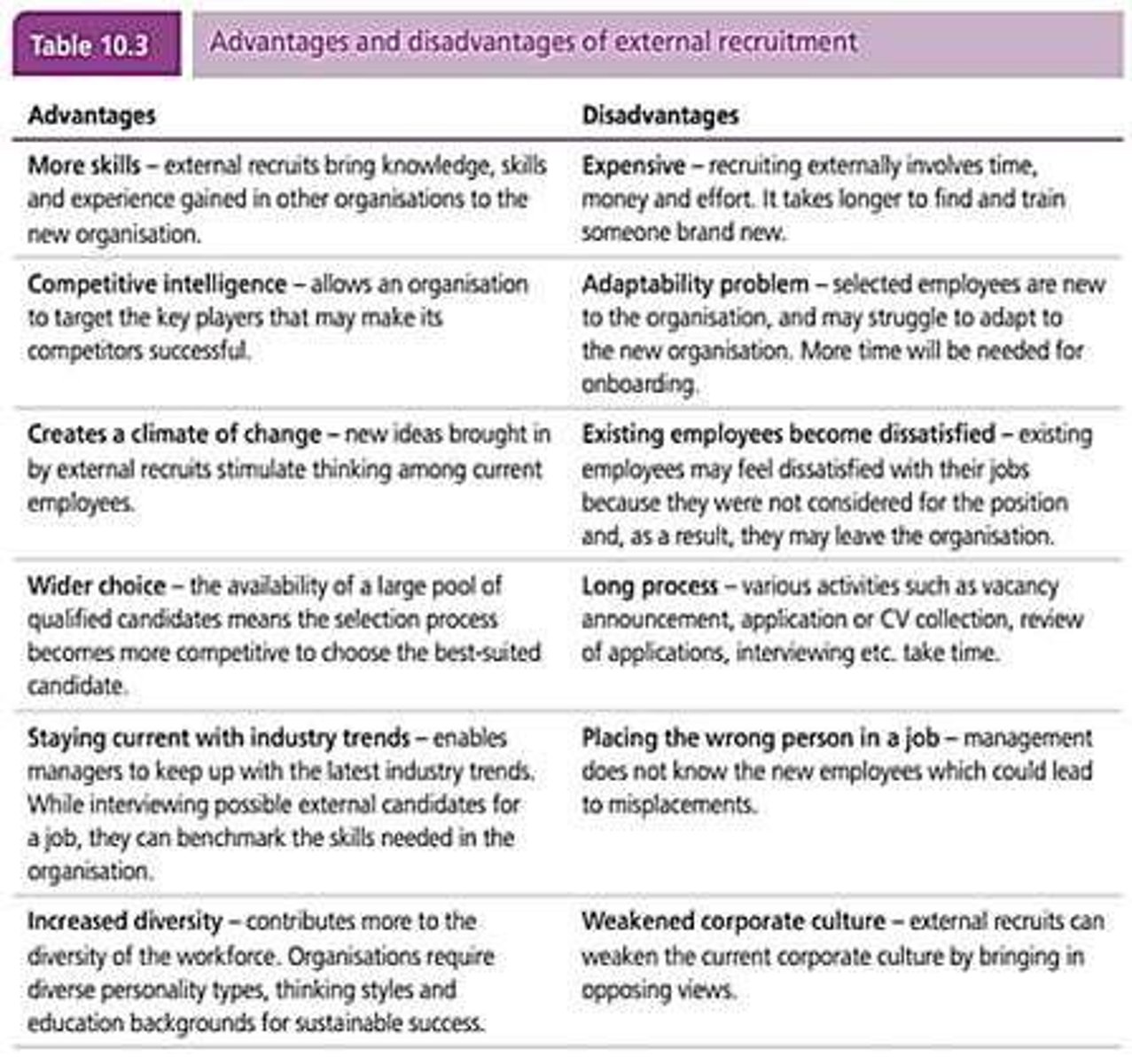
What is headhunting?
The process of targeting candidates with specific skills for recruitment, often using executive search professionals.
What are some internal recruitment techniques?
Self-selection, referrals, promotions, and transfers.
What is the purpose of advertising in recruitment?
To attract potential candidates by placing ads on job websites or the organization's website.
Why is it important to find the right employees quickly after a vacancy occurs?
To maintain productivity and reduce costs associated with staff turnover and future recruiting efforts.
What is self-selection in the context of recruitment?
When a position is advertised internally for current employees to apply for promotional opportunities.
What role do training institutions play in recruitment?
They can be sources for potential candidates, especially for entry-level positions.
What is the purpose of proficiency surveys in recruitment?
To keep updated records of workers' qualifications and experiences for potential job openings.
What are online job postings?
Jobs advertised on the Internet through professional networking sites or job boards.
What is the function of employment agencies in recruitment?
To search for potential candidates on behalf of organizations.
What is the impact of appointing unsuitable candidates?
It can lead to conflict, stress, and anxiety within the organization.
How does a job advertisement help in recruitment?
It informs unsuitable candidates that they should not apply, focusing on qualified applicants.
What is the significance of shortlisting candidates?
It narrows down the pool to the most suitable candidates for interviews.
What is the role of a supervisor in the recruitment process?
To work with HR to determine the details of the vacant position.
What is the potential benefit of using professional institutions in recruitment?
They can provide access to qualified professionals in specific fields.
What is the importance of compliance with laws and regulations in recruitment?
To ensure that the recruitment process is fair and legal.
What is the role of employment agencies?
Businesses that search for potential candidates based on their experience and efficiency.
What does demotion mean in a workplace context?
The process of moving employees to a lower position within the organization.
What is re-hiring?
Recruiting retired or retrenched employees again due to a shortage of qualified personnel or increased workload.
What is the selection process in HR?
The process by which an organization chooses the most suitable person for a position from a list of applicants.
Why is proper placement important in HR?
Competent employees may become inefficient and unsatisfied if placed in the wrong position.
What administrative tasks must be completed when a new employee reports to work?
Completion of UIF forms, medical aid forms, tax forms, etc.
What are the scenarios that require employee placement?
New employment, promotions, transfers, and demotions.
What is the first step in the selection process?
Assessing short-listed candidates using various selection methods.
What methods are used in the selection process?
Application forms, CVs, interviews, psychometric tests, assessment centers, medical examinations, and references.
What is a verbal offer of employment?
An informal offer made to the preferred candidate outlining the terms and conditions of the appointment.
What does onboarding (induction) entail?
The process of introducing a new employee to the organization, its procedures, environment, and co-workers.
What is the purpose of induction for new employees?
To make them feel welcome and part of the new work environment.
What should be prepared before a new employee arrives?
The new employee's workstation and informing co-workers about the newcomer's job duties.
What is the difference between training and development?
Training involves teaching specific job skills, while development prepares employees for future roles.
What are the purposes of training and development?
To retain employees, improve performance, update skills, and prepare for promotions.
What is performance appraisal?
The systematic evaluation of employee performance to understand their abilities for growth and development.
What are the three methods of training?
Away-from-the-job methods, on-the-job training, and ongoing development.
What is the significance of performance appraisal for management?
It provides vital information for decisions regarding promotions, salary increases, and further investment in employees.
What should be avoided during the onboarding process?
Offering too much information at once, as it can overwhelm the new employee.
What is the ongoing nature of onboarding?
It should continue as the newcomer develops within the organization.
What is job enlargement?
Adding additional duties and responsibilities to reduce boredom.
What is the purpose of apprenticeships?
To achieve artisan status while working.
How does coaching differ from mentoring?
Coaching is job-focused and performance-oriented, while mentoring provides support for individual growth and maturity.
What are group- or team-building methods?
Activities designed to improve team performance through adventure learning or team-building exercises.
What are the two objectives of performance appraisal?
Evaluative objectives to assess past performance and determine compensation, and developmental objectives to enhance employee skills for future performance.
Why are performance appraisals valuable to an organization?
They improve employee performance, provide a basis for financial rewards, and identify training and development needs.
What is direct remuneration?
Salary or wage received, linked to a person's position or productivity.
What is indirect remuneration?
Fringe benefits added to salary or wage, such as leave, insurance, and housing allowances.
What role does remuneration play in employee retention?
It compensates employees for their work and ensures they feel fairly rewarded to prevent turnover.
What does the Basic Conditions of Employment Act no. 75 of 1997 establish?
Workers' rights regarding hours of work, holidays, and safety regulations.
What is the significance of managing diversity in organizations?
It ensures representation and addresses issues of stereotyping and equal opportunity in the workplace.
What are the five core characteristics that make a job motivating?
Skill variety, task identity, task significance, autonomy, and feedback.
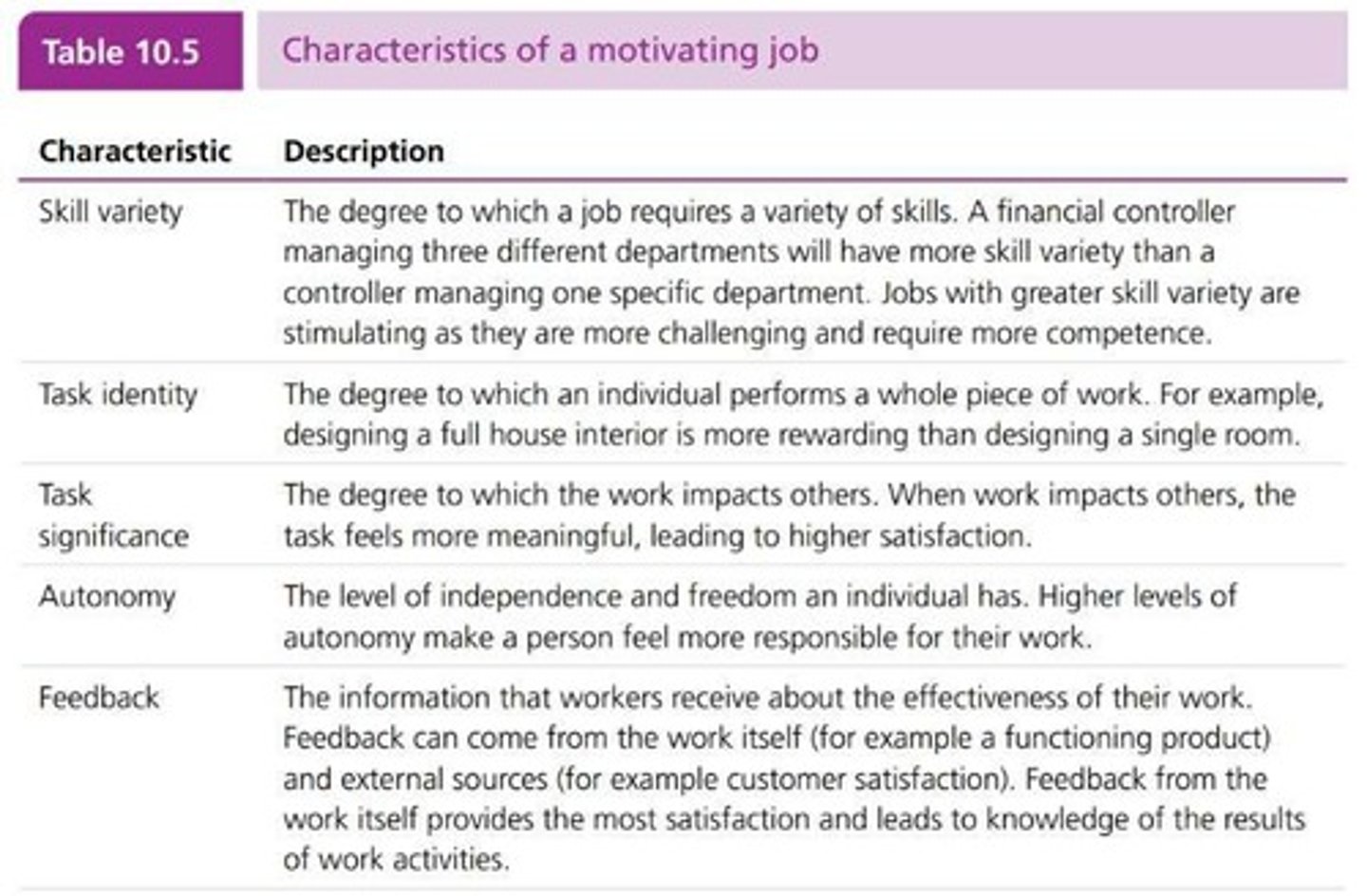
What is organizational culture?
A system of shared traditions, values, and beliefs that govern behavior within an organization.
What is employee wellbeing?
The mental, physical, and emotional health of employees.
What are Employee Assistance Programmes (EAP)?
Programs designed to help employees deal with personal problems that might adversely impact their job performance.
What is the purpose of the Protection of Personal Information Act 4 of 2013 (POPI Act)?
To protect personal information and an individual's right to privacy, setting minimum standards for processing personal data.
What should organizations do if personal information is compromised?
They are obligated to inform the individual and the Information Regulator.
What is burnout in the workplace?
A phenomenon where employees experience exhaustion due to prolonged stress and excessive workloads.
What does 'quiet quitting' mean?
Doing only what is required by the job description without going above and beyond.
What are some components of employee wellness programs?
Yoga classes, voluntary health testing, educational sessions on diseases, and support for life-threatening illnesses.